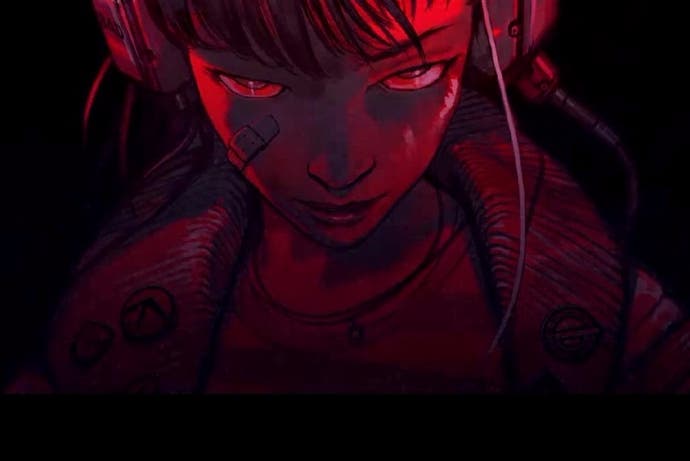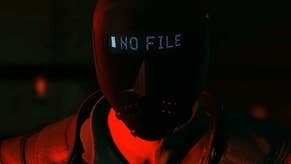Ruiner review
Dogfight.
Ruiner hates you. I don't mean that just in the sense that Ruiner is punishing, though it's certainly that - the game's "Normal" difficulty setting makes the average Call of Duty final stand look like a pillowfight in a nursery. I mean that Ruiner's entire universe is radioactive with spite. It's there in the lighting and palette of Rengkok South, the game's late 21st century urban hub - a quagmire of oozing red mist, tar black, toxic orange and the occasional, lonely note of blue or pink, the final moments of Alien's Nostromo blurring into the hellish racecourse of Neo Tokyo's "Running Man". It's there in your character, a pipe-wielding cyborg parody of dysfunctional machismo who communicates using a pixel-display helmet - favourite phrases include "hello darkness", "nowhere to hide" and the ever-poetic "kill you". And it's there, above all, in the shape of "Her" - the nameless geek girl in phat headcans and a Kaneda-brand capsule jacket, who frees you from another hacker's control during the prologue.
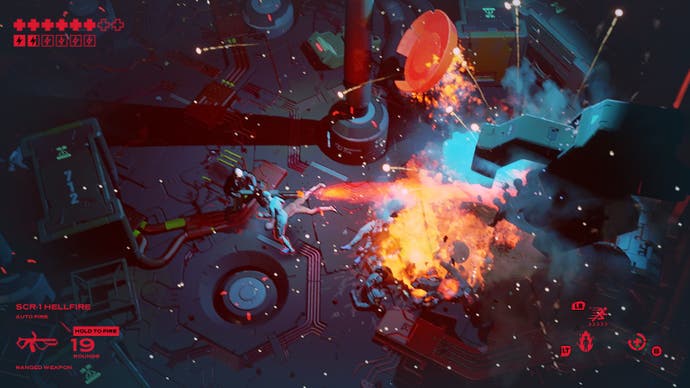
At first glance you might take her for another of gaming's dutiful sidechicks, tossing in context and combat tips as you go about rescuing your mysterious brother from a typically malevolent far-future corporation. In practice, you are very much her pet. "Kill them, puppy," she whispers, her portrait briefly intruding across the view as cyborg assassins and crusty gangbangers tumble from dropships and elevators. "Kill them. Your brother needs you." Far from the usual cheerleader with an internet connection, this is the predatory female stereotype that self-described Nice Guys and MRA meme junkies lose sleep over, the Girlfriend who makes a gelded plaything of men. Death offers no solace, for your vaguely demonic ally operates both inside and outside the game's fiction, doubling as its combo announcer and restart mechanism. "Get up, puppy," she snaps, as you're eviscerated by high-frequency blades and railgun fire. "That was painful to watch." I must have heard that line a hundred times during my seven hours with the game. "Get up, puppy. What's done is done."
Ruiner is, in short, a moderately entertaining action game and an utterly hopeless portrait of entrenched misanthropy - an experience that embraces all of cyberpunk's cruelty, technological excess and squalor but none of its hard-earned wistfulness or serenity, its capacity to see transcendence in alleyway trash or the fizzle of a holographic adboard. In portraying a world ruled by the manufacturers of VR games and cranial implants, the game represents itself, naturally enough, as your enemy, declaring "you are being played" as the front-end loads. As with much of cyberpunk, this is a dystopia to which gender is integral, in which men are wired-up bludgeoning implements and women are either seductive commodities or tyrannous cybernetic abominations (or both). If that sounds like I'm reading too much into things, just wait till you run into "Mother Engine", a pincered robot nightmare who screams "give it to me, baby" before voiding liquid fire all over your rapidly eroding forceshield. Back in Rengkok South, meanwhile, you'll meet the "Sisters of Disorder", a prostitute sect who accept payment only in the form of death - expire 50 times during the adventure and you can trade all that in for certain, strangely intangible rewards.
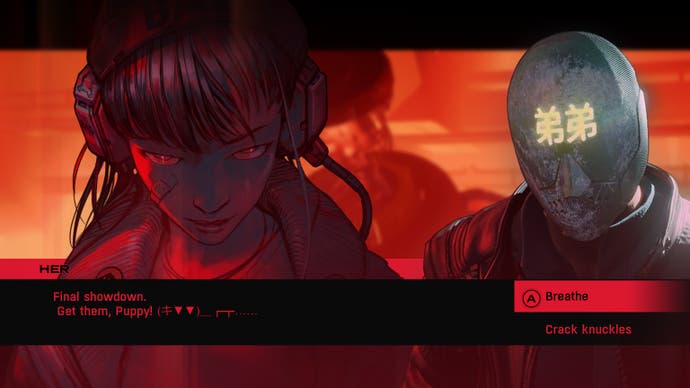
The combat itself is like thrusting your hand repeatedly into a bee hive. Ruiner's campaign takes you through the guts of an immense underworld factory complex, each chapter a garishly-lit A-to-B jaunt enlivened by a deranged, fuzz-heavy electronica score that includes work from Millennium Actress composer Susumu Hirasawa. At intervals forcefields spring up across entrances and exits and you're locked into a combat arena. The basic weapons are your inexhaustible three-round-burst Ruiner pistol, a no-nonsense length of pipe (later replaced by a sword) and a superhuman dash move. You can hold the dash button to slow time and place up to three destination markers in succession - a trick that allows you to, for instance, zip around the shelter of a shipping crate, land a blow on a juggernaut and retreat to safety before your enemy can counter. Given that enemies usually approach from all angles, that the on-screen projectile count often strays into double digits, and that scooping up dropped weapons such as flamethrowers can be the difference between life or death, the dash quickly becomes the most important tool in your arsenal.
There are also unlockable special abilities that consume energy (which replenishes a little between clashes), ranging from stun and frag grenades to deployable or portable energy barriers, a hack attack that turns a foe into an ally and a chargeable swing that slows down anything caught in the backwash. One of Ruiner's smarter touches is that you can respec your character completely without penalty to suit the situation - taking all the skill points you've spent on a passive trait that raises the ammo capacity of dropped weapons, for instance, and plugging them into an ability that renders you briefly invulnerable on the point of death.
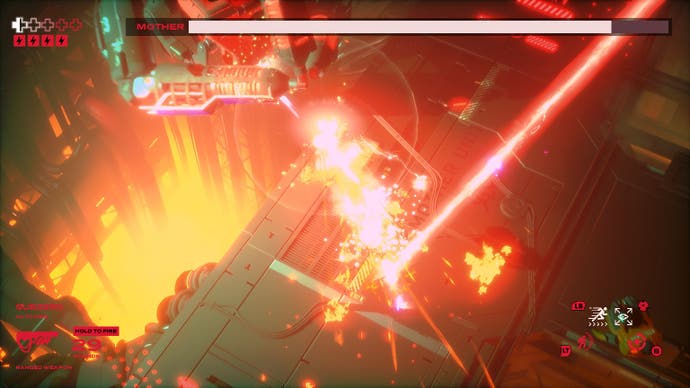
Add in a diverse if hardly esoteric set of firearms - beam cannons that freeze or incinerate people, sonar weapons that inflict huge knockback, electricity guns whose bolts spread to other targets - and you've got a brawler cum bullet-hell shooter that is as flexible as it is compressed. When you can see what's going on, at least. Ruiner suffers a little for the business of its encounters; during the first couple of hours, I was often too busy tracking my character's position amid blast clouds, blood spray, reflected bullets and the lethal flash of teleporting ninjas to attend to my health bar in top left.
That degree of overwhelm is, of course, consistent with the game's air of vindictiveness. I'm reminded a little of gamejam hit Pony Island, which sees you battling against the misbehaving interface of a Satanic arcade machine. Less forgiveable is the way the campaign tails off, introducing new props and tougher foes in line with your evolving abilities, but never quite elaborating its various, torrid devices into something on par with a Devil May Cry duel. The better lategame ideas include emitters that drain your energy till destroyed, a nasty additional pressure when you're fending off a mech that's given to jumping ground-pounds, and a chamber full of deadly energy barriers that challenges you to hold the centre against waves of skirmishers. But the boss battles fall flat, as gruelling as they can be - the odd simple terrain puzzle aside, I polished off most of them by running rings around my target with the trigger held down, and many of the climatic encounters are just variations on a theme.
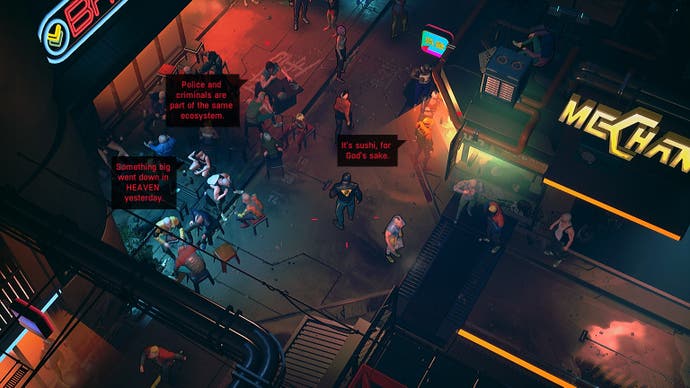
Ruiner is a profoundly ugly game. That isn't necessarily a mark against it, in itself - Ruiner actively sets out to be ugly, after all, and the result is one of cyberpunk's more memorable dystopias. The problem is that its ugliness doesn't really go anywhere save down, ever deeper into its own iniquity. The governing themes - coercion, dehumanisation, a truly sickly interpretation of the war between sexes - are evident from square one, and the plot's revelations are both predictable and bluntly telegraphed. Still, it's easy to lose yourself in the seethe and blur of each gladiatorial exchange, as limbs are rent from limbs and laser bolts sink hot wires into the darkness behind your eyelids. And if you ever do feel too numb to continue, that babydoll hacker is always there to give you a nudge. Get up, puppy. I'll tell you when you can stop.
